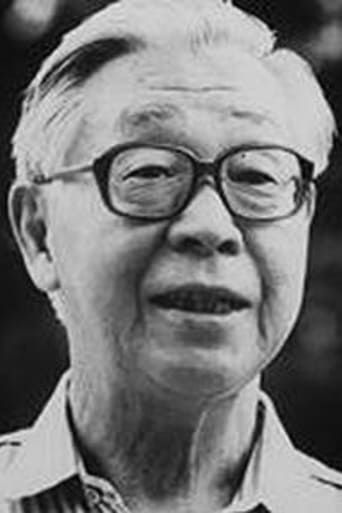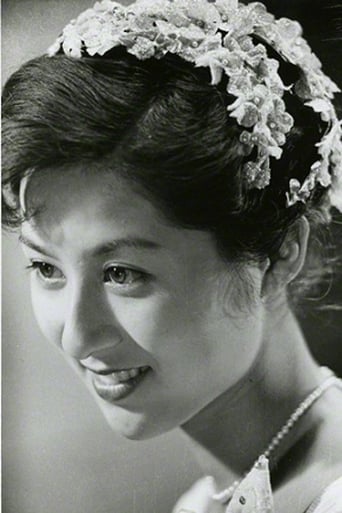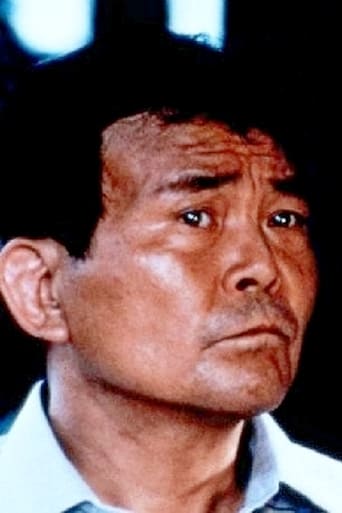TrueJoshNight
Truly Dreadful Film
Chirphymium
It's entirely possible that sending the audience out feeling lousy was intentional
Lidia Draper
Great example of an old-fashioned, pure-at-heart escapist event movie that doesn't pretend to be anything that it's not and has boat loads of fun being its own ludicrous self.
Scarlet
The film never slows down or bores, plunging from one harrowing sequence to the next.
Blueghost
This film brings sadness to me. Why? Because it's one of those films that you know doesn't have a happy ending, but it does. It's the encapsulation of an instructor's life, and how he's imparted his wisdom and knowledge to the students who worship him.As always, it's exceptionally well shot and well acted. The framing is perfect, and the staging of the action is heart warming. The small vignettes are what they are; slices of Japanese life from pre-war to post reconstruction, and all degrees in between. I don't have too much more to say on this film, because I wish it could end differently. I wish it could end where everyone gets together and they all have a picnic or something. I wish life could go on forever, and that no one would have to leave. and I guess that's the sense and broken promise that I get from this film. But, like Charles Schultz reminded us through Charlie Brown, sooner or later someone would have say goodbye.And that's what Madadayo is all about.
MisterWhiplash
At first I thought I would have to resist the sentimental clinging I expected for Madadayo, the final film written and directed by Akira Kurosawa (though it was not, from what I read in Emperor and the Wolf, necessarily his intended last project- then again, neither was Prairie Home Companion for Altman). But what can I say, except that maybe I'm a sucker for films that deal with a protagonist facing old age - done well, of course. In this case, Kurosawa decides to do a 180 from what he did in Ran, however still with the same emotional depths. If Ran was a plunge into the dark recesses of the human soul, where death and destruction (chaos as the title says) can occur, then so can there be joy and laughter and songs sung all for someone who can inspire a small quasi-community too. Sounds sappy, to be sure, but somehow Kurosawa is wise enough in his true golden years here to know that there can be a level of honesty, and a good level of fun, in dealing with potential problematic subject matter. I don't even know if I would recommend the picture to most Kurosawa fans, particularly the ones who dig into only his samurai films (the only inklings of death happen off-screen, to cats more than anyone else). But it struck a chord with me in a way only the movies can do.The professor is Hyakken Uchida (Tatsuo Matsumara, his first film for Kurosawa), and he's based on a real professor, who wrote many books and was also much beloved in Japan. There's no real story here, per-say, at least when comparing it to the tight structures of the director's bulk of work. It's a series of vignettes showing how, upon retiring from teaching, his students become his best friends and most ardent supporters through good and bad times. This includes his home being destroyed during WW2, attaining a new home (and the problems with that, at first), and also in the most tragic section of the picture when he loses his cat. The latter of these almost had me in tears, which is a little crazy as I almost never (sans Umberto D) feel emotionally tugged and pulled over a pet problem in a story. But by this point in the film there's been so much that's happened in the side of sweetness and joy with Uchida- his yearly celebration thrown by his students that involves revelry and drinking and songs and all that- as well as the great bits of wisdom and nuance, that this comes as an unfathomable shock. And it's in due really to how Tatsumara plays it, how the character is completely believable in having this intense vulnerability on the flip-side of his kindness and humility, and Kurosawa's tact with this story in general. It ranks up there with the best emotional scenes in Ikiru.But for the most part, Madadayo is a serene near-masterpiece of moods, and the primary mood here is that on the other side of despair, as Sartre once put it, life begins. Even through losing his house and seeing the rubble all around him, and the emotional crisis with the cat, Kurosawa's primary strengths here are in getting the little details perfect, the student characters that (perhaps a little underdeveloped) are totally indebted to the professor and love him like a kind of Sensai. The big 60th birthday celebration contains such little details sewn in, like the one character who wont stop naming the train-stations as everyone else around him sings and dances and gives speeches in revelry, and in its own minor-key way is like a supreme sequence to rank with Kurosawa's other major sequences in his films. There's also the little asides that show early on that Uchida is not just a conventional-lovable old man, but very intelligent and with an intuition that strikes to the core of matters. I also loved the moment when he says that if one isn't afraid of the dark, there's a defect in that person, without the side of imagination.Meanwhile, Kurosawa guides this work of two-thirds happiness and one-third sorrow in a very personal tone, as if he meditated on each scene before going into the cutting room. Rarely does he falter in getting the emotional notes right, even the sappy ones, and he gets from Uchida a fully rounded performance. He also decides to leave his film- with children in Uchida's dream doing the 'Not Yet' game- with one of his most staggeringly beautiful compositions (maybe an all-time great closing shot too). As I mentioned, I'm not even sure if Kurosawa knew this would be his last film, but he makes it as a light-hearted, humorous yet serious tome on living peacefully, loving both people and animals (feel the chill in the room when the character mentions skinning cats), and it's enlightening in how facing death is shown as a sign of the ultimate, superlative strength.
Irradiata
I just finished watching "Madadayo" and can still feel tears welling up. I was moved at the beautiful movie and its message of kindness and living well. It took me a while to get into the film as it is rather slow and not much does happen, but Kurosawa is a master of mood, characterization and setting the scene and gradually, the movie takes its hold on you.The movie starts with the Professor's retirement from teaching. We learn he taught German, and he must have been a good teacher as well as quite a character, because large numbers of his students stay in touch with him through the decades. Kurosawa shows us that the students love and respect him dearly, as well as finding him eccentric. They refer to him as "solid gold". However, I kept asking "Why? Why would these people with busy lives, following their own paths, continue to hold birthday parties for their eccentric old professor?" And as the movie continued, I found myself answering my own question. Why not? It's a win-win situation for all involved. The students value the professor's company and despite joking protests to the contrary, the professor enjoys the visits and increasingly comes to depend on them. In post-WWII Japan, there must have been little to celebrate, so having an annual excuse to get together with people you enjoy would be reason enough. Kurosawa also expounds on one of his main themes from "Red Beard"; kindness begets kindness and that is what we continually shown in "Madadayo". The students help build the professor a new house after his home is destroyed in the fire-bombing of Tokyo. The professor loses his cat and the students and the community band together to try to find it, celebrating and congratulating one another when they think they find it, and commiserating and empathizing when they don't. The annual birthday parties continue and evolve from just the male students drinking with their professor to banquets involving their wives and children. I began to fall under the spell of how wonderful it would be to be part of this community, to know these people, to know there were others looking out for me, willing to help if I needed it, relishing my company, and knowing that once a year I could get together with all my friends from school (the ones we all lose touch with because our busy lives follow diverging paths), celebrate the life of a great man (a favourite teacher's lessons stay with you forever) and be part of something bigger and gentler and kinder.I can understand why someone expecting the excitement of "Seven Samurai", the suspense of "High and Low", or the innovation of "Rashomon" would be disappointed in "Madadayo", but if you enjoyed the lessons of "Red Beard", the gentle pull of "Madadayo" will delight and soothe you. You'll be left with a serene feeling of well-being, wishing you could be one of the Professor's students.
niwasan
I have not seen any other of Kurosawa's movies, so I comment on this film from that perspective. This movie is wonderful, one of my favourite movies. It doesn't try to follow the typical movie routine... it is far different to what most viewers would be used to. To enjoy it you have to realise that nothing is really going to happen - this film is simply made to be enjoyed.I would however like to complain about the TERRIBLE treatment this film has been given on DVD. Both the Hong Kong and US releases are awful quality. There is a good Japanese DVD, but it has no English subtitles. Come one someone, release the remastered version please!




